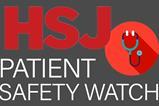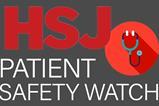HSJ hosts the Patient Safety Watch newsletter, written by Patient Safety Watch chief executive James Titcombe.
Good afternoon, and welcome to this fortnight’s edition of the Patient Safety Watch newsletter.
Maternity inquiry delayed after confusion over who should run it
An investigation into maternity incidents at Gloucestershire Hospitals Foundation Trust has been delayed by at least six months because national agencies have been unable to decide who should lead the work, HSJ has learned.
The trust announced in May it would commission reviews of mortality linked to maternity and neonatal services after a BBC Panorama programme, which aired in January, claimed cultural and staffing problems had caused avoidable baby deaths. However, the maternity investigation is yet to start, and the neonatal investigation has just begun.
The trust initially approached Maternity and Newborn Safety Investigations, then contacted NHS England’s regional team, which is now working to appoint an external assessor for the maternity review.
My view? The Morecambe Bay Investigation Report (2015) recommended (rec 44) the establishment of a “framework… on which future [maternity] investigations could be promptly established” to “include setting out the arrangements necessary to maintain independence and work effectively and efficiently, as well as clarifying responsibilities of current and former health service staff to cooperate”.
In May, the Thirlwall inquiry published a review of the implementation of inquiry recommendations going back more than 30 years, including the Morecambe Bay investigation’s recommendations. This review concluded that recommendation 44 had been fully implemented, referring to a Department of Health response in July 2015 which pointed to the establishment of the Healthcare Safety Investigation Branch.
I think this is a misunderstanding. HSIB (now HSSIB) does not have a remit to carry out this type of review. Indeed, there would not have been a six-month delay in starting a review at Gloucestershire if this were the case.
The history of NHS inquiries is littered with recommendations that have simply gathered dust and been forgotten, while opportunities for learning and change continue to fall through the gaps as a consequence.
We need a new approach. Perhaps this could be an independent recommendations oversight committee, with membership including families affected by the inquiries that gave rise to the recommendations in the first place, to monitor progress and publish the status regularly.
In the meantime, the delays in starting a clearly needed review of Gloucestershire’s maternity safety must be urgently resolved.
In other news this edition:
Midwifery failures cost baby ‘significant’ chance of survival
Staying on the same subject, Gloucester Hospitals Foundation Trust’s maternity safety has also been in the headlines this week following a Nursing and Midwifery Council hearing regarding the tragic death of baby Jasper White, who was born at the Cheltenham Birth Centre in May 2019.
As reported by the BBC, despite Jasper’s health deteriorating within minutes of being born, there was a 50-minute delay in transferring him to Gloucester’s neonatal unit. He died aged just 11 hours old.
The NMC panel found the two midwives involved in Jasper’s care had committed misconduct and their fitness to practise was impaired.
In particular, the NMC panel found Hazel Williams, the senior midwife, had failed in her duty to escalate the situation so that Jasper could be transferred to a neonatal team; that she had encouraged Lisa Land – the other midwife involved – to change medical notes describing his condition as “poor” to “good” three days after his death, and that she had added extra entries to his notes.
Court told nursing and medical director did not act on suicide risks
A trial at the Old Bailey has been told how a trust’s nursing director and associate medical director should have taken steps to reduce risks in a mental health inpatient ward by making sure bin liners had been removed.
North East London FT and its ward manager Benjamin Aninakwa have been charged with manslaughter regarding the 2015 death by suicide of inpatient Alice Figueiredo. Both deny the charges. The trial at the Old Bailey is expected to last 12 weeks.
Making the prosecution’s opening statement, Mr Duncan Atkinson KC said: “The failure in the completion and analysis of Datix records, and the failure to issue appropriate guidance to make plastic bags – a recognised means of self-harm generally; and a clear means by which Alice had herself self-harmed – inaccessible to patients like Alice, can be attributed to the senior management through the director of nursing and the associate medical director, amongst others.”
Donna Ockenden speaks out over daughter’s poor care
Leading midwife Donna Ockenden has spoken out following the poor care of her daughter Phoebe, who was left to wait on a chair in an accident and emergency department for seven hours, despite suffering from epilepsy and seizures.
Ms Ockenden – who led the investigation into maternity failings at Shrewsbury and Telford Hospital Trust and is currently heading the maternity investigation at Nottingham University Hospitals Trust – is quoted by BBC News as saying: “Despite her learning disabilities and being known to the service, she was dropped off in the waiting room on her own. She is 20 but she is really vulnerable and was left in a chair for seven hours still having some seizures.
“Initially she was left in the waiting area on her own. It’s just unspeakable, it’s absolutely disgusting and disgraceful.”
Watchdog considers criminal case over child’s sepsis death
HSJ has reported that the Care Quality Commission is considering prosecuting a trust over the death of 13-year-old Chloe Longster from sepsis.
Chloe died in November 2022. A coroner has since found neglect and a string of failures at Kettering General Hospital contributed to her death. A KGH medic told the inquest antibiotics were not administered in line with sepsis guidance and Chloe had waited several hours for intubation with oxygen in intensive care.
University Hospitals of Northamptonshire, of which KGH is a member, has apologised to the family, adding it has introduced “a number of changes since Chloe’s death” to improve sepsis screening.
Working groups for a 10-year plan for health announced
The government has established 11 working groups to support the development of the 10-year health plan. According to the announcement, four groups will consider the future vision for the NHS and seven groups will consider areas that must change to make that vision a reality.
Each group will have two co-chairs: one from either the Department of Health and Social Care or NHS England and one external to these organisations.
It’s positive to see such a collaborative approach being taken as the 10-year plan is developed, with some fantastic people leading the different work groups. One observation is that there is currently no patient safety stream. Although I’m sure it could be argued patient safety runs as a thread throughout, I can’t help feeling this is an omission. It would be great to hear what other people think.
Sharing some good stuff…
Future safety ambitions to save more babies’ lives
The Sands and Tommy’s joint policy unit has published a proposal for new government ambitions to reduce baby loss. The proposed targets (set for 2035 to align with the forthcoming 10-year NHS plan) include a stillbirth rate of 2.0 stillbirths per 1,000 total births, and a neonatal mortality rate of 0.5 neonatal deaths per 1,000 live births for babies born at 24 weeks’ gestation and over, as well as targets to reduce pre-term birth rate, inequalities and number of miscarriages.
Robert Wilson, head of the Tommy’s and Sands policy unit, said: “Current ambitions to halve the 2010 rates of stillbirth and neonatal death are due to expire in 2025. We know from other countries that more progress is possible.
“The NHS 10-year plan is an opportunity to set new ambitions – focused on matching the best-performing countries in Europe and eliminating inequalities. With political will, we can save more babies’ lives, but achieving these ambitions will require much more comprehensive action from government.”
Here at Patient Safety Watch, we strongly endorse and support this proposed ambition and hope the government will consider adopting it as a key part of a new maternity strategy, alongside new ambitions to reduce maternal mortality and brain injury.
Life Beyond the Cubicle
The fantastic organisation, Making Families Count, has published new free eLearning resources for health and social care professionals working in mental health services and emergency departments. They are available via the NHS Learning Hub – Search for Life Beyond the Cubicle once logged in – while more information is available via the Making Families Count website.
The resources aim to educate and update clinicians on the importance of involving families wherever possible during mental health crises to improve patient care, avoid harm and reduce deaths. They were developed by Making Families Count in partnership with Oxford Health FT, with funding from NHSE south east region (HEE legacy funds).
The resources were co-produced by people with lived experience as patients, family carers and clinicians, with support from an advisory group drawn from a wide range of expertise, tested in 11 trusts and independently evaluated.
THIS Space 2024
A final share for this edition is a plug for THIS Space 2024, the annual conference run by the fantastic THIS Institute. The free-to-attend conference is for anyone with an interest in the evidence for improving healthcare quality and safety. The online event takes place on 26 November and the full programme and link to register is available here.
That’s all for this edition. Please look out for our next edition in a fortnight’s time. In the meantime, thanks for reading and stay safe.
James Titcombe

Topics
- Care Quality Commission (CQC)
- Department of Health and Social Care (DHSC)
- East Midlands
- Emergency care
- GLOUCESTERSHIRE HOSPITALS NHS FOUNDATION TRUST
- Health Services Safety Investigations Body (HSSIB)
- KETTERING GENERAL HOSPITAL NHS FOUNDATION TRUST
- Legal
- London
- Maternity
- Mental health
- North East London NHS Foundation Trust
- Nursing and Midwifery Council
- OXFORD HEALTH NHS FOUNDATION TRUST
- Patient safety
- Policy and regulation
- South
- South West






























No comments yet